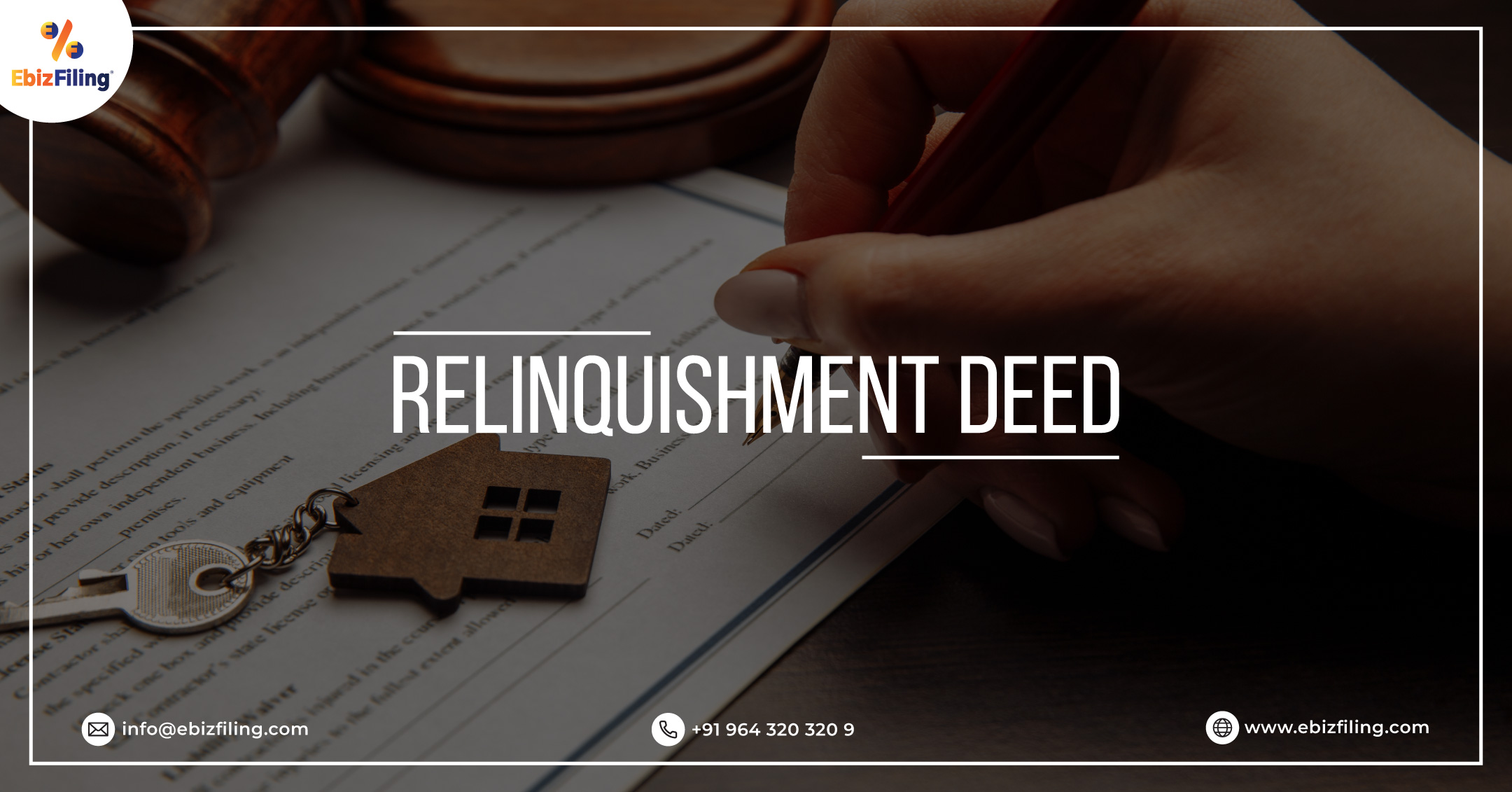
-
May 17, 2022
All about Relinquishment Deed Meaning and Procedure for Registering a Relinquishment Deed
A relinquishment document would be prepared and recorded to allow co-owners to lawfully transfer their share of the property to another co-owner. By abandoning ownership, co-owners of a joint Hindu property can give up their claim to this immovable asset. In this article information such as Relinquishment Deed meaning, Validity of Relinquishment Deed, Registering a Relinquishment Deed, and its benefit is mentioned.
Relinquishment Deed Meaning
A relinquishment deed is a legal draft in which a legal heir relinquishes his or her legal rights to inherited property in exchange for the good faith of other heirs. The relinquishment deed transfers title when a person dies intestate. By inheritance, the legal heir will pass their interests to a co-owner or another legal heir of the same property. Either a consideration or no consideration relinquishment deed will be assigned. For the transfer to be released or surrendered, the persons concerned must be co-owners of the property.
Elements in the Relinquishment Deed
-
It must be written
In the case of immovable property, relinquishment of rights must be done solely through a written instrument known as a relinquishment deed, which must be signed by all parties and witnessed by at least two witnesses.
-
Consequences
Such a transfer of rights results in the release of one co-share owner’s and the expansion of the shares of the other co-owners.
-
Registration is required
Relinquishment deeds are covered by Section 17 of the Registration Act of 1908, hence a release of immovable property rights must be recorded. The registration takes place at the sub-office registrar’s in the jurisdiction where the property is located.
-
Irrevocable
Even if made without deliberation, a release or relinquishment deed is irrevocable. The property must be owned by more than one person to be validly relinquished.
-
Easy to Draft
A relinquishment deed can be prepared and registered in a matter of days, and the process is inexpensive.
-
Property cannot be relinquished in favor of a third party
Property cannot be relinquished in favor of anyone other than a co-owner. The transaction will be recognized as a gift if the relinquishment is undertaken in the name of someone who is not a co-owner.
Benefits of Relinquishment Deed
-
When a property is jointly owned, a relinquishment deed allows for a smooth transition.
-
In the case that a person dies without leaving a will, a relinquishment deed might assist in the transfer of property (or intestate).
-
A relinquishment deed is a legal document that allows a legal heir to surrender ownership of the inherited property to other legal heirs.
Documents required for Relinquishment Deed
-
Information needed for a Release Deed.
-
Name of the Releaser, Age, and Address.
-
Address Property description, Name of the Releasee, and Age.
-
If the release is contingent on payment of a fee, the fee must be specified in the Relinquishment Deed.
-
Aadhar Card and PAN Card Information of a Relasee and Releaser.
-
A document needed to be drafted for the stating intention.
-
Legal Documents of the Property.
Procedure for Registering a Relinquishment Deed
Section 17 of the Registration Act of 1908 requires that the relinquishment deed be recorded. It’s because the deed in question is a legal document in which a legal heir transfers his constitutional rights in an inherited property to other legal heirs in exchange for their compassion. The processes involved in registering a relinquishment deed are shown below.
-
The very first stage in the Registration Process is known as preparing/drafting a relinquishment deed. We recommend that you seek legal advice from a lawyer who can draught the deed to your specifications.
-
The Relinquishment deed must be printed on 100 rupee stamp paper. Every detail should be included in the relinquished property’s deed.
-
Once the deed is completed, it must be filed with the sub-registrar of guarantees in the property’s jurisdiction.
-
After that, you must pay the registration fee, which varies from state to state.
-
Both parties and two witnesses must make an appointment (visit physically) with the sub-registrar office on the designated day for the deed’s registration. Bring all of the necessary documentation for the verification and registration process.
-
A week following the procedure as mentioned above, a Registered Relinquishment Deed can be received.
-
In circumstances where a person is physically incapacitated and cannot visit the sub-registrar office, a provision has been created under ‘Section 31 of the Act’ sanctioning the Registering officer. It allows physically challenged people to visit anyone who wants to present a Relinquishment Deed for Registration.
-
It is essential to highlight that an unregistered relinquishment deed is not a valid deed and cannot be challenged in court.
Validity of Relinquishment Deed
The relinquishment Deed shall be regarded as valid if the following conditions are met. These are the scenarios:-
-
The person must have an interest in the property that is being relinquished.
-
Apart from the father’s self-acquired property (no membership right during the father’s lifetime), the relinquished property should be a Joint Hindu Family property (ascribed membership).
FAQs (Frequently Asked Questions)
1. What are the ramifications of signing a Relinquishment Deed?
The implications are the release of one co-share owner and the rise of other co-owners shares.
2. What happens if a Relinquishment Deed lacks Consent?
The same reasons can be used to dispute a relinquishment deed used to revoke a general contract. It can only be canceled when there is a lack of agreement, not because of your preferences.
3. What is the difference between Relinquishment Deed and Gift Deed?
Relinquishment A deed releases or transfers a person’s legal right to a piece of property. A Gift Deed, on the other hand, is a document in which one person transfers his legal rights to a property to another person in the form of a gift. Relinquishment Deed is the one that needs to be inherited property, while the property gifted does not have to be inherited.
4. Is the deed of relinquishment irrevocable?
It is implied that the relinquishment deed is irrevocable by nature, even if it is done without contemplation. If a legitimate Relinquishment is in issue, the property should be owned by more than one individual.
Hindu Undivided Family
Own a family business and want to pass on the legacy to next generation? HUF is for you. Form an HUF
About Ebizfiling -










Reviews
Vishwas Bhagwat
05 Aug 2019Very good organisation. Very efficient and very effective.
Thomas
26 Jun 2018Sir, Your service was really good.
Hetal Verma
27 Jan 2018Great work done by the Ebizfiling team. Good luck for the future.
February 27, 2026 By Steffy A
Companies Compliance Facilitation Scheme (CCFS-2026) Let’s Understand Running a company in India comes with annual compliance responsibilities. Every year, companies must complete annual return filing, submit financial statements, and maintain proper MCA compliance. But in reality, many businesses miss […]
February 24, 2026 By Steffy A
How to Start a Business When You Have No Ideas? Introduction Many people want to start a business but struggle because they don’t know what business idea to choose. If you feel stuck, you are not alone. The truth […]
February 24, 2026 By Steffy A
Why More Startups Prefer Online Business Support? Introduction Startups today operate in a fast-moving digital environment where speed, flexibility, and smart resource management matter more than ever. Traditional business support models often involve higher costs, manual processes, and slower […]